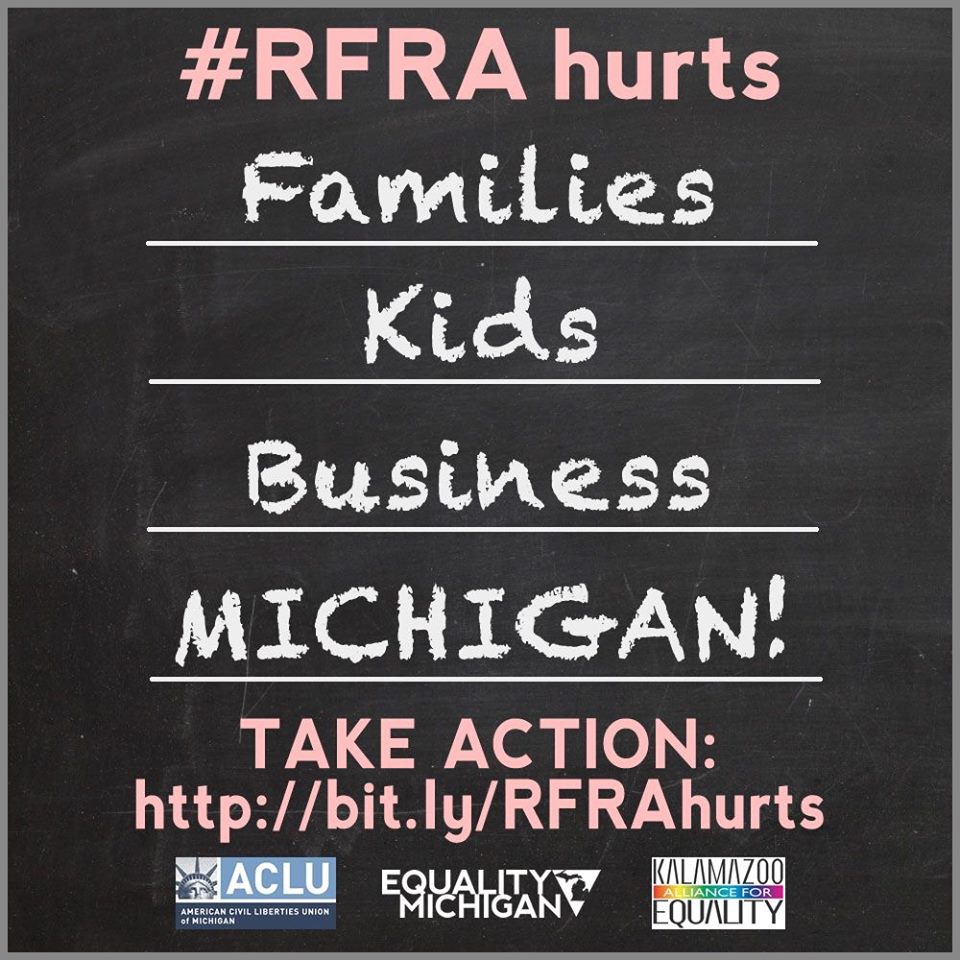A look at what’s at stake if RFRA legislation comes to Michigan.
 On April 28, the Michigan Senate Judiciary Committee will take testimony and debate Senate Bill 4, the Michigan Religious Freedom Restoration Act (RFRA). Although a vote is not expected on SB 4 that day, odds are good there will be one eventually. And understanding the implications of RFRA legislation is important — especially because there’s more than one RFRA-style bill in the Michigan Legislature right now.
On April 28, the Michigan Senate Judiciary Committee will take testimony and debate Senate Bill 4, the Michigan Religious Freedom Restoration Act (RFRA). Although a vote is not expected on SB 4 that day, odds are good there will be one eventually. And understanding the implications of RFRA legislation is important — especially because there’s more than one RFRA-style bill in the Michigan Legislature right now.
Most of the attention on RFRA legislation has understandably focused on LGBT people, especially in Michigan where there are currently no civil rights protections for the LGBT community under the Elliott-Larsen Civil Rights Act.
However, RFRA legislation has the potential to hurt everyone. In Michigan, we’re seeing the potential harm to children and families right now. A vote is expected in the Senate soon on House Bills 4188, 4189 and 4190, which would allow faith-based adoption agencies to turn away any would-be adoptive parents or even children who they object to on religious grounds — even if the agency receives state funding. The biggest risk is to the 13,000 children in Michigan’s foster care system at any given time, who could be denied loving homes. But couples and single people who want to be parents face potential discrimination, too. Not just because they might be LGBT people, but because they might be the “wrong” religion — or for any reason the agency finds to object on religious grounds.
As heinous as that legislation is, SB 4 is even worse, because the broad language of the bill would allow religious objections to be made by anyone, for any reason. As I wrote last week, the bill makes it clear that the objection doesn’t even have to be based on an established religion. As long as it’s someone’s personal belief, that’s good enough under SB 4.
The potential ramifications of SB 4 are sweeping and troubling.
- Women could be denied access to birth control or — even more dangerous — life-saving medical care in the event of a miscarriage.
- Anyone could be denied healthcare services, in fact, if a provider finds anything objectionable about them.
- A single mother could be denied housing because her landlord believes she should be married.
- A police officer could refuse to patrol a mosque, church or synagogue because he or she is of a different faith.
- A man could beat his wife and claim he is exempt from the law because his religion says his wife is his property.
- LGBT people could be discriminated against in myriad ways, including being turned down for a job they’re qualified to do.
These examples are extreme — but they are all possible if SB 4 ever becomes law. That’s because RFRA legislation is extreme. What’s more, it’s unnecessary. Freedom of religion is already protected under the U.S. and Michigan Constitutions.
To be clear, no one who opposes RFRA legislation is saying people aren’t free to practice their faith. Every American is free to practice his or her religion, or no religion. But no one should be forced to live by the tenets of someone else’s faith. And religion shouldn’t be an excuse to break the law or be exempt from the same laws everyone else adheres to.
RFRA legislation also has the potential to do serious damage to Michigan’s economy. If major companies and events threaten boycotts to the state as they did after Indiana passed RFRA legislation, there’s no telling how much damage could be done to Michigan businesses — including collateral damage to businesses that fully intend to serve everyone even if RFRA legislation were passed. One estimate put the economic loss due to the Indiana boycotts at more than $250 million over six years.
Governor Rick Snyder has said he’ll veto any RFRA legislation that isn’t accompanied by an amendment to the Elliott-Larsen Civil Rights Act that extends protections to LGBT people. Make sure he — and the Michigan Legislature — know you don’t want RFRA to come to Michigan.
There are a few ways to be heard.
- Provide testimony opposing SB 4 at the Senate Judiciary Committee hearing on Tuesday, April 28 at 3 pm in Room 110 of the Farnum Building, 125 W. Allegan Street in Lansing. The more people in attendance the better. Be sure to bring a written copy of your testimony with you and fill out a testimony card. You can also provide written or oral testimony by contacting the committee clerk by sending an email or calling (517) 373-1721.
- Contact your State Senator and request a NO vote on HB 4188-90 and SB 4.
- Sign this petition from Equality Michigan and partners to tell your Senator, the Senate Judiciary Committee and Governor Snyder you oppose RFRA legislation in Michigan.
- Call Governor Snyder at 517-373-3400 or 517-335-7858 and ask him to keep his promise to veto RFRA legislation.
Don’t let the voices of a few extremists drown out the majority of Michiganders who oppose RFRA legislation. Speak out and say RFRA hurts everyone.
[Image courtesy of Equality Michigan.]



